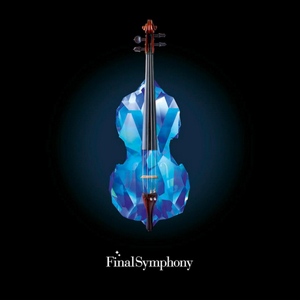Bringing FFVI to Symphony
Roger Wanamo made his debut arranging game music for symphony orchestra in the 2009 concert Symphonic Fantasies, in which his Chrono Trigger and Chrono Cross suite won praise for its seamless melding of themes and dramatic, narrative-focused arrangement. Since then Wanamo has joined fellow Finland native Jonne Valtonen as a mainstay of producer Thomas Böcker's Symphonic series concerts, arranging such series as Mario and Mario Galaxy in Symphonic Legends, and The Legend of Zelda in Symphonic Legends London.
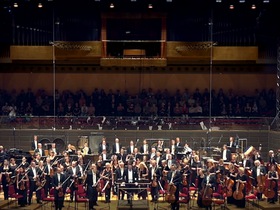
He's also one of few artists with extensive experience arranging for orchestra Nobuo Uematsu's acclaimed soundtrack for Final Fantasy VI, featuring its themes prominently in his 2011 "Concerto for Piano and Orchestra from Final Fantasy" for Symphonic Odysseys, then focusing exclusively on the title for his 2013 "Final Fantasy VI Symphonic Poem: Born With the Gift of Magic" in Final Symphony. To mark the 20th anniversary of the game's original release, Soundtrack Central talked with Roger Wanamo about his works arranging Final Fantasy VI, and about the qualities that make the original soundtrack so unique to this day.
Soundtrack Central: Roger, thanks for taking the time to talk with Soundtrack Central about your symphonic arrangements for Final Fantasy VI, here on the eve of the game's 20th anniversary. To begin, what was your own introduction to the Final Fantasy VI soundtrack?
Roger Wanamo: My first introduction to the FFVI soundtrack actually was when I played the game. This was a few years back, in preparation for Symphonic Odysseys in Cologne. For that concert I arranged a piano concerto based on music from Final Fantasy I-VI. In the concerto FFVI is the most dominant part; it's featured in all three movements, while the earlier titles I-V appear less. I guess the concerto ended up with a heavy focus on FFVI because when I played it, I was totally overwhelmed by it, both by the game itself with its great storyline, and of course by the music.
There were so many great themes in there that I wanted to arrange, all of which couldn't fit in the concerto, so after this I still wanted to do more. When producer Thomas Böcker told me we were going to do Final Symphony, with one part focusing entirely on FFVI, I immediately knew I wanted to arrange that part. I am very happy that I got the opportunity to do so, it is a great joy to work with such fantastic material.
STC: Looking back at that Symphonic Odysseys piano concerto, you used Final Fantasy VI's "Opening Theme" to begin the first movement, "The Fierce Battle" in the third-movement finale, and in the second movement in between is the theme for Celes. What led you to choose a theme most famously known for its operatic vocal rendition as a focal part of your piano concerto? Was there a thematic reason behind it, or would you say it was more musically motivated, seeing as how it complements its accompanying theme (FFIII "The Boundless Ocean") so nicely?
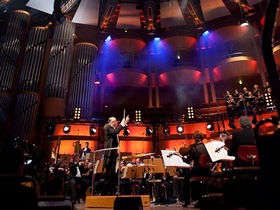
Wanamo: I knew from the start that I would like to use Boundless Ocean in the slow movement of the concerto. There's an interesting story behind that actually. When planning Symphonic Odysseys, we discussed several different soundtracks that could be featured. One suggestion that came up was SaGa, also known as Final Fantasy Legend. I listened through the soundtrack and found this one piece that I liked a lot, called "Heartful Tears", and immediately said I'd like to work on that piece. The idea didn't catch on and Jonne Valtonen was to arrange another piece from SaGa, so I started planning the Final Fantasy concerto, beginning with listening through the soundtracks from FFI-FFIII. And there, lo and behold, Uematsu had reused the Heartful Tears theme in a slight variation on the FFIII soundtrack.
Later, when the form of the concerto started to take shape and I decided to use a theme from FFVI in every movement, I found Celes's theme to be the most fitting companion to Boundless Ocean. I suppose some personal preference also was behind it, I just loved the theme a lot already when playing the game.
STC: Before we move on to Final Symphony, I have a question about one other Symphonic series concert: Is it true that you arranged the Kefka vs. Sephiroth encore segment in Symphonic Fantasies Tokyo? How much of a challenge was it to arrange those two themes together?
Wanamo: Yes, guilty! That was really a lot of fun to arrange, I was literally laughing out loud on several occasions while writing the arrangement. It was surprisingly easy to mix those two themes together. Despite being quite different character, there are a lot of similarities in them as well. When I got the idea and started playing around with those two themes "battling" each other, it all fell into place quickly.
STC: So, following your piano concerto partially dedicated to Final Fantasy VI in Symphonic Odysseys, and a brief crack at Kefka's theme in Symphonic Fantasies Tokyo, you get the chance to arrange a work entirely dedicated to FFVI for Final Symphony, the result of which is your symphonic poem "Born With the Gift of Magic". Even at 18 minutes - longer than any single FFVI orchestral arrangement yet recorded - that's still a fraction of the three-hour original soundtrack. How do you decide what themes to include?
Wanamo: This is usually the hard part. There is so much that I wanted to include, but not room for nearly everything. Originally my plan was to focus on the numerous character themes. Then the plan changed to focus on Terra and her story. One part of this story would focus on her friends, the other character themes. Then I had to drop that as well, as the piece would have become way too long.
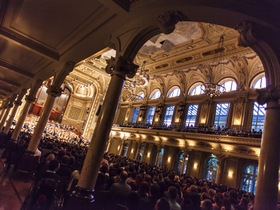
In the final arrangement, the pieces included are motivated by storytelling. At first we meet Terra as she is in the beginning of the game, a slave to Emperor Gestahl. This is portrayed with Terra's theme controlled by the emperor's theme. The emperor's theme controls the progression and Terra's theme just follows along. Next the villain, Kefka, is presented, showing how he goes completely insane. After this we learn about Terra's heritage as half Esper. Towards the end of this part, Kefka appears as the sealed gate opens and the Espers escape. From there it moves straight into the final battle, which switches rapidly between a lot of different battle themes. This is how I like to do the battle segments of these arrangements. And at the end, as the smoke clears over the battlefield, Terra emerges victorious and we hear her theme in its full glory.
STC: Once you decided to focus strongly on Terra's story, did the choice of which themes to include become fairly clear? Are there times when a theme you'd like to include just won't fit musically with the rest of the piece, or do you find you can generally work a theme in once you've decided on it?
Wanamo: Sometimes it can indeed be very challenging to fit themes together. A few times over my career I've had to leave out some theme just because I cannot make it fit musically, but I don't think that happened with this piece. My goal is to create a coherent piece where the musical progression feels natural and new themes feel like they belong when introduced. How to move from a theme of one character to another theme of a totally different character is usually what causes the most headaches. Sometimes I have absolutely no idea how to do it and try a lot of different things until it works, sometimes I have an immediate idea but the technical execution requires a lot of work.
My goal is to create a coherent piece where the musical progression feels natural and new themes feel like they belong when introduced.
An example of the latter would be the transition from the Esper World ("Another World of Beasts") to the battle. I had this idea in the second part of the Esper World theme of speeding up by cutting it shorter and shorter until it goes directly into "Metamorphosis", which starts the battle. To find out the exact structure of that transition took a lot of time. How long should it be that it doesn't feel rushed or too long? How fast is it speeding up, how many bars of 7/8, how many of 6/8, 5/8 and so on? What about the orchestration, how fast should it grow? How many repeats with just strings and woods, and when do the brass come in? To top it off, the basses are not following the meter of the upper voices, they stay in 7/8 until they change to Kefka's theme in 2/4. When it's set up like that, it's a very big job to make the slightest change to the structure. I practically had to redesign the baseline for the whole segment whenever I wanted to change something.
STC: It's been some time since I heard the debut performance in Wuppertal, but listening to this recently released recording from the Stockholm show, a couple of those more complex transitions seem easier to follow. Did you make adjustments after the debut for subsequent performances?
Wanamo: There were very few changes made to this piece after the performances in Wuppertal and London. Only small details like dynamics and things. Usually complex material is easier to follow on the second listening, so this could be one reason. Another would be the acoustics. Stadthalle Wuppertal is a great performance venue, but it has quite a long reverb. This can make music with lots of things going on a bit muddy, as it's hard to pick out the individual lines. The recording from Stockholm is very crisp and clear so you can hear the details better.
STC: Speaking of venues, Final Symphony has been performed in six different venues, all in different countries, since its May 2013 debut. What's it been like seeing your work performed in so many different places? How have the fan reactions compared?
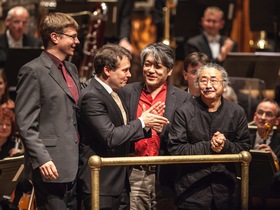
Wanamo: It's absolutely wonderful to hear it performed by so many different orchestras in so many venues. The performance with the London Symphony Orchestra was of course something really special, because it's the London Symphony Orchestra! If someone had told me a few years earlier that in 2013 I'd be sitting in Barbican Centre listening to the LSO performing scores I have written, I would have laughed them in the face. I mean, as I started studying composition back in 2004 I had a lot of more or less unrealistic dreams, but never in my wildest dreams did I imagine getting a performance with the LSO within 10 years.
The only performance I haven't been able to attend was the performance in Tokyo. I heard that was also something special. They even received a standing ovation, which might be the norm in Europe, but Japanese audiences usually don't do that. Everyone was shocked when the audience just jumped out of their seats at the end of the concert.
The most emotional performance for me was still the concert with Tampere Philharmonic Orchestra. I lived in Tampere for eight years while studying at Tampere Music Academy, and attended the concerts with TPO almost every week, so this really felt like my home venue. As it was in Finland, there were of course a lot of friends and family in the audience, and several friends in the orchestra as well. To top it off, the orchestra gave a truly spectacular performance. Everyone was astonished by the high quality of both the orchestra and the beautiful Tampere Hall.
STC: You've arranged such fan-favorites as the Chrono series in Symphonic Fantasies, the Mario series in Symphonic Legends, and most recently the Legend of Zelda series in Symphonic Legends London. What about Final Fantasy VI do you think distinguishes it from other game music works, and explains the great admiration fans still have for it twenty years after its release?
Wanamo: Nobuo Uematsu obviously has a great sense for melodies and writes beautiful tunes that will be stuck in your head for a long time after playing the games. But that can be said about other composers as well. What makes Uematsu so special is that he is very varied and constantly evolving. He's not the kind of guy who finds one thing that works and sticks with it, which unfortunately many other composers might do. The Final Fantasy soundtracks all have a different flavor and include a very wide range of expression, from humorous music, to sad and emotional themes, to intense battle music. Of course, as the music also is tied to one of the most successful franchises in gaming history, it becomes even more important to the fans. The stories in the games have so much depth and so many emotional moments.
What makes Uematsu so special is that he is very varied and constantly evolving.
STC: There have been a fair number of Final Fantasy VI orchestral arrangements to date - the original arranged album Grand Finale, several segments in previous Symphonic series concerts as well as other concert series like Distant Worlds, and now your Final Fantasy VI Symphonic Poem in Final Symphony. Is there room for more? Any personal favorites that you'd like to arrange?
Wanamo: There's always room for more Final Fantasy VI orchestral arrangements. I believe there are still quite a few tracks that haven't been covered, and those that have been covered can be arranged in different ways. As for me, I still would like to do more of those character themes. I'm sure many of them have been arranged for orchestra already - I haven't heard all the orchestral arrangements made - but I bet new interpretations are welcome as well.
The theme that was stuck in my head the most after playing the game was Cyan's theme. I would love to work on that one. Then there's of course Relm's gorgeous theme and many others. Another theme that I thought of arranging was "The Mines of Narshe". That piece has a very nice mood that would work well in an orchestral setting, but this symphonic poem wasn't the place for it.
STC: I think I speak for many other FFVI fans when I say I hope the chance comes for you to arrange more of the game's many great themes one day. With this year's performances of Final Symphony as well as Symphonic Legends London now past, any hints about what we can expect from you in the future?
Wanamo: Well, I think you can expect more to come. Let's just say I have a lot to look forward to in the coming year.
STC: One final question to close: Did you wait for Shadow?
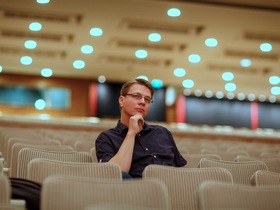
Wanamo: Haha, yes, I did! But to be honest, at that point I was already playing with the help of a playthrough guide. There was no way I would have had time to figure it all out with time left to actually write some music.
STC: Thanks again for talking with Soundtrack Central, Roger. It's been a pleasure hearing your insights behind Final Fantasy VI Symphonic Poem and your other Symphonic series works. We'll be looking forward to hearing what's next in store!
Wanamo: Thank you for the interview, it has been a pleasure for me too. Always nice to go down memory lane and remember all the great projects I have been so lucky to be involved in!
To hear Roger Wanamo's work arranging Final Fantasy VI and more don't miss Soundtrack Central's coverage of the album releases for Final Symphony, Symphonic Fantasies, and Symphonic Odysseys.

